Sands of Iwo Jima Blu-ray Movie
HomeSands of Iwo Jima Blu-ray Movie 
Olive Films | 1949 | 109 min | Not rated | Nov 11, 2014Movie rating
7.3 | / 10 |
Blu-ray rating
| Users | 0.0 | |
| Reviewer | 4.0 | |
| Overall | 4.0 |
Overview
Sands of Iwo Jima (1949)
During World War II, a marine sergeant must turn his recruits into fighting men.
Starring: John Wayne, John Agar, Adele Mara, Forrest Tucker, Wally CassellDirector: Allan Dwan
| War | Uncertain |
| Romance | Uncertain |
| Drama | Uncertain |
| Action | Uncertain |
Specifications
Video
Video codec: MPEG-4 AVC
Video resolution: 1080p
Aspect ratio: 1.37:1
Original aspect ratio: 1.37:1
Audio
English: DTS-HD Master Audio Mono
Subtitles
None
Discs
25GB Blu-ray Disc
Single disc (1 BD)
Playback
Region A (B, C untested)
Review
Rating summary
| Movie | 4.0 | |
| Video | 4.0 | |
| Audio | 3.5 | |
| Extras | 0.0 | |
| Overall | 4.0 |
Sands of Iwo Jima Blu-ray Movie Review
Reviewed by Jeffrey Kauffman November 13, 2014From our isolated perches in our capitalist funded ivory towers, we often lament the use of “propaganda” by fascists and/or Communist governments, insisting that we’re above such shenanigans. People point to such filmmakers as Leni Riefenstahl (Triumph of the Will) or even Sergei Eisenstein (Battleship Potemkin, Alexander Nevsky) as creative artists who helped to shape public opinion over various sociopolitical issues that confronted their respective countries. Of course there’s little doubt that the American film industry wasn’t immune to such efforts, as Hollywood’s output during World War II more than admirably proves. Interestingly, one of the films regularly cited as a kind of cinematic cheerleader for America’s war effort came out some four years after hostilities had ceased. Sands of Iwo Jima is an unusual “war” film from a couple of perspectives, not the least of which is the fact that the titular battle comes fairly late in the proceedings, after a glut of relatively soap operatic developments involving a martinet sergeant named Stryker (John Wayne, receiving his first of only two Academy Award nominations for Best Actor in the role) and his unruly brigade of neophytes, many of whom hold pretty significant grudges against their commander.
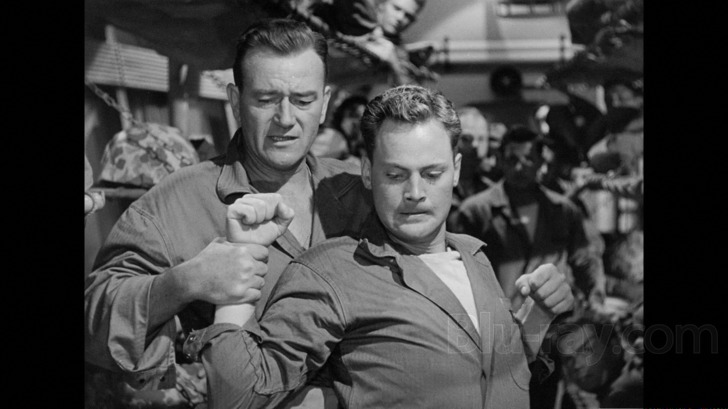
Sergeants are often the “enforcers” in military aggregations, laying down the law to their underlings, even if those rules and regulations are being passed down from higher ups. Sands of Iwo Jima sets up the discontent that a gaggle of grunts feels with regard to Stryker, who is seen as a heartless brute who might have some nascent sadistic tendencies. Chief among the complainers are Private Conway (John Agar), the son of an officer (who was Stryker’s mentor back in the day), and Private Thomas (Forrest Tucker), who feels Stryker is creating obstacles to his career advancement.
While Stryker’s strained relations with his rifle squad are detailed quickly in the film’s opening, Sands of Iwo Jima opts for a montage (speaking of Eisenstein) to develop the idea that Stryker is all about working his men—and hard. A series of grimacing head shots superimposed on the troops going through their paces makes it clear that Sergeant Stryker is a force to be reckoned with.
But then for an ostensible war film, Sands of Iwo Jima spends a great deal of its opening forty or so minutes detailing other elements, including a love affair and eventual marriage for Private Conway. That sets up a couple of vignettes for later in the film, but it also keeps Sands of Iwo Jima from resonating as a traditional action picture.
The first taste of actual war comes not on Iwo Jima but in the Battle of Tarawa, where once again Stryker’s methods are called into question by his greener than green underlings. There’s also a rather well done sequence that finds Private Thomas making a kind of boneheaded and completely avoidable mistake that results in tragedy. His long simmering conflict with Stryker finally comes to blows, but his reaction when the two are caught simply reinforces the idea that Stryker, for all his faults, is a leader of men and an object of perhaps grudging admiration.
The film then takes yet another detour, albeit a (studio bound) scenic one to Honolulu, where Stryker goes on leave. This interesting sequence, while once again delaying any signs of battle, finally shows the softer side of Stryker and remains a fine example of how simply and honestly Wayne could underplay a scene. In a kind of unstated but still clear pickup for a one night stand, Stryker goes back to a woman’s apartment only to discover a surprising fact about her. For a 1949 film, it’s surprisingly trenchant, albeit handled in a typically discursive way that forces the viewer to read between the lines.
After another brief interlude which is more or less the counterweight to Stryker’s interchange with Thomas, this time focusing on Conway, the film finally gets to its titular conflict with less than a half hour left in its running time. This is where the film will most likely more than satisfy the traditional action war film fan, with a well staged and rather massive sequence detailing the Marines’ efforts to take the island. The film has already utilized a wealth of stock footage in everything from the aforementioned montage of troop trainings to later moments (including scenes of wounded men being cared for), but here everything is intercut especially well, creating a very visceral battle environment that still manages to focus on the central characters, each caught in their own life or death situations.
That leads to what is arguably the film’s most notable sequence, a finale that doesn’t just tug at the hearstrings, it virtually rips out the viewer’s aorta and shows it to him like the mad shaman in Indiana Jones and the Temple of Doom. Without going into too much spoiler-ish detail, a devastating event, which in and of itself might cause a throat lump or two, is blended with the reading of an unfinished letter and a recreation of the iconic image of the Marines hoisting the American flag atop Mount Suribachi. Leni Riefenstahl would be proud.
Sands of Iwo Jima Blu-ray Movie, Video Quality 
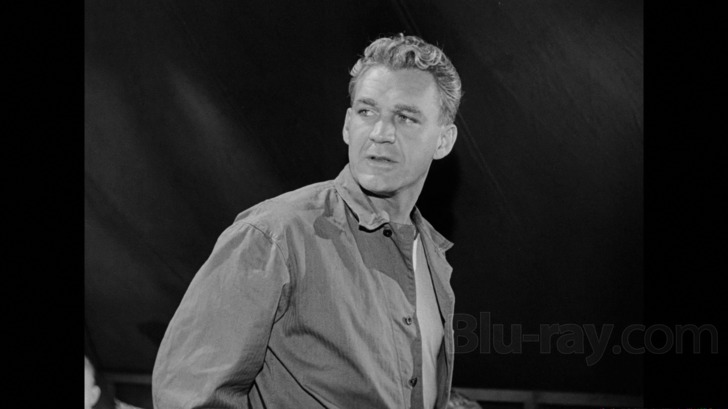
Sands of Iwo Jima is presented on Blu-ray courtesy of Olive Films with an AVC encoded 1080p transfer in 1.37:1. As has tended to be the case with many of these Olive releases culled from the Republic catalog, "what you see is what you get," with Olive's hands-off approach almost always guaranteeing no overt digital intrusion, but also no explicit restorative efforts. In the case of Sands of Iwo Jima, that's actually a good thing, for the elements are in generally surprisingly good condition. There are still some attendant age related issues, including occasional dirt and flecks, but nothing that rises to the level of genuine concern. What is striking (Stryking?) about this transfer is its genuinely solid contrast, something that supports really fluid gray scale and good, deep blacks. There are some minor inconsistencies late in the film on what look like a couple of day for night shots, but otherwise things are very consistent. Grain is natural looking and shows no signs of having been digitally scrubbed. The stock footage, which is used quite a bit throughout the film, is in widely variant condition, as might be expected. Some, including the epochal final battle, looks pretty good, though it's obviously more ragged and blown out at times than the bulk of the film. Other elements, including some utilized in montage sequences, is fairly shoddy looking, but is only onscreen for a few seconds.
Sands of Iwo Jima Blu-ray Movie, Audio Quality 
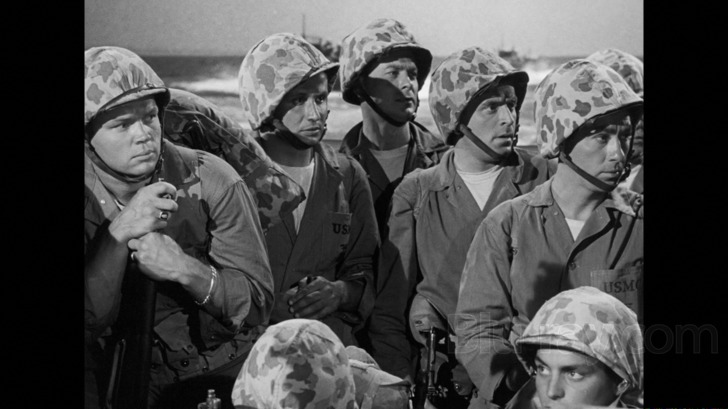
Sands of Iwo Jima's lossless DTS-HD Master Audio Mono track shows some very slight distortion in the upper midrange which is especially evident in some of Victor Young's score, including the opening credits' use of "The Marine Hymn". This anomaly can also slightly "fuzz" some of the explosive sound effects in the two main battle sequences. Otherwise, this accounting nicely supports the film's dialogue, with no issues other than a slightly boxy sound.
Sands of Iwo Jima Blu-ray Movie, Special Features and Extras 
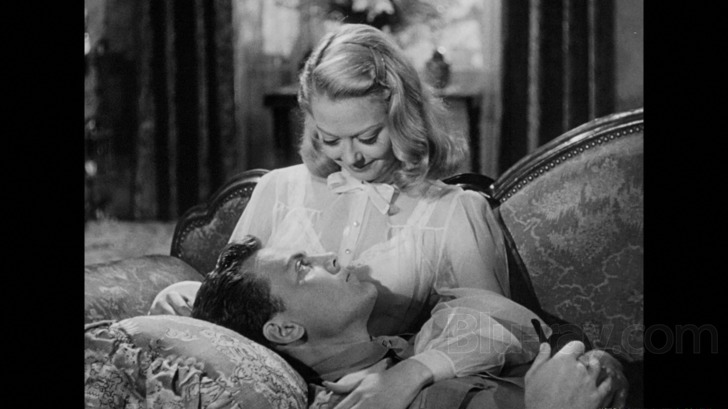
No supplements are offered on this Blu-ray disc.
Sands of Iwo Jima Blu-ray Movie, Overall Score and Recommendation 
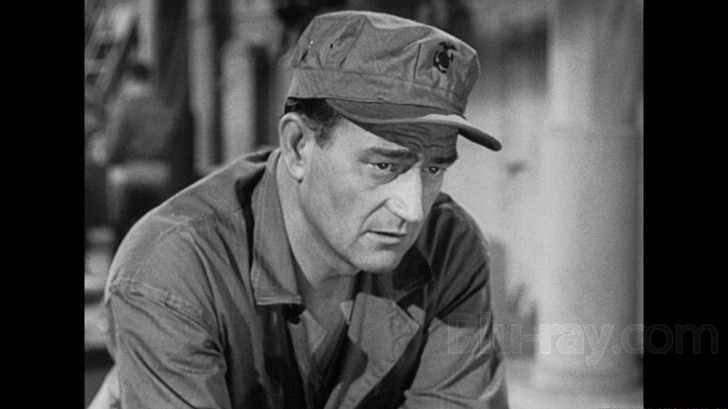
Those going into Sands of Iwo Jima expecting a circa 1944 version of Saving Private Ryan may be disappointed, at least if they're expecting a big battle scene up front. The only battles on display until well past the half hour mark are between Stryker and his intransigent men. That said, Sands of Iwo Jima nicely charts the destinies of several interlinked characters, and provides Wayne with a forceful role that tamps down emotion in favor of stoic resolve. With some well utilized stock footage and the participation of several real life Marines, Sands of Iwo Jima may not be a "war film" in the traditional sense, but it delivers quite a bit of impact nonetheless. Recommended.
Other editions
Sands of Iwo Jima: Other Editions
Similar titles
Similar titles you might also like

Battle Cry
Warner Archive Collection
1955

The Dirty Dozen
1967

They Were Expendable
Warner Archive Collection
1945

The Bridge at Remagen
1969

Twelve O'Clock High
1949

The Fighting Seabees
1944

Never So Few
1959

Flying Tigers
1942

The Green Berets
1968

The Young Lions
Limited Edition to 3000 - SOLD OUT
1958

The Boys in Company C
1978

12 Strong
2018

A Bridge Too Far
1977

Wings
1927

Too Late the Hero
1970

Hell Is for Heroes
1962

Run Silent, Run Deep
Special Edition
1958

Attack!
Fragile Fox
1956

Cross of Iron
1977

Generation Kill
2008


